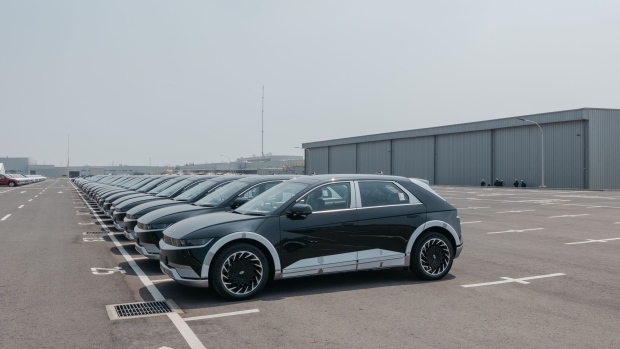Dec 16, 2022
Hyundai Hints at Reassessing US Investment Due to EV Rules
, Bloomberg News

(Bloomberg) -- Hyundai Motor Co. may need to reassess plans to build manufacturing capacity in the US if the Inflation Reduction Act poses a risk to growth, a government affairs executive at the automaker said.
The South Korean carmaker said in May it is investing $5.5 billion to build an electric vehicle assembly and battery plant near Savannah, Georgia. Hyundai will create 8,100 new jobs with the twin plants, breaking ground in early 2023 with production to start in 2025. Georgia Governor Brian Kemp heralded it as the largest economic development project in the state’s history.
Hyundai is working with its government to forge a deal with the US Treasury Department that would offer some relief to new rules that require EV makers to assemble their cars in North America and reduce their reliance on Chinese suppliers in order to be eligible for subsidies. The legislation was signed by US President Joe Biden but the final details are still being ironed out.
“If this continues to potentially hurt our growth, I think we’ll have no choice but to really reassess where we go,” Hyundai Vice President of Government Affairs Robert Hood said during an online seminar hosted by the Wilson Center on Thursday. “We don’t want to do that. The US is so important to us as a company.”
“Hyundai Motor Group has made binding commitments to invest in and manufacture EVs in the US,” a spokesperson for the automaker said in a text message Friday. “However, HMG has raised concerns regarding the impact of the Inflation Reduction Act and is encouraging the Department of the Treasury to offer flexibility as it issues guidance on the legislation.”
Hood said Mexico is becoming a popular option for automakers. “The price and the cost of labor and production and everything else is substantially cheaper in Mexico,” he said, calling on the US to “delay everything” related to the law.
Even so, the biggest challenge for the Georgia facility isn’t building or running it, but securing workers in a tight labor market, according to Hood. “The biggest challenge going forward is finding those 8,000 Americans willing to come work in the plant,” he said.
(Adds comment from Hyundai in fifth paragraph.)
©2022 Bloomberg L.P.


